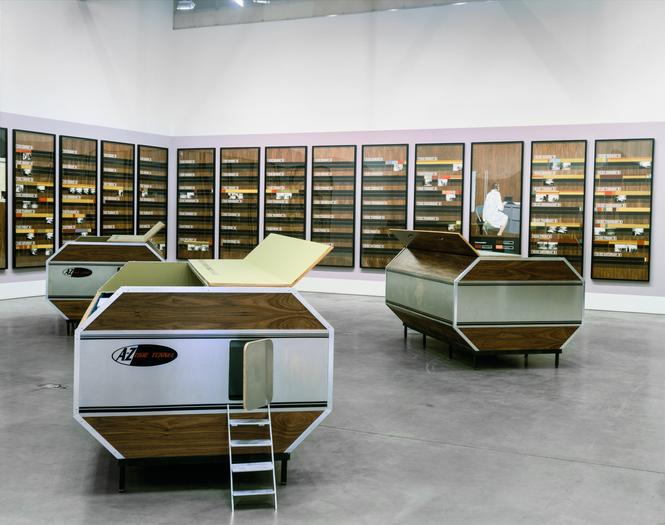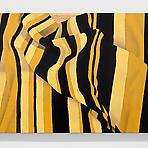Andrea Zittel
A-Z Time Trials
April 22 – May 27, 2000
Main Gallery
What would it be like to live without any source of imposed time? You could sleep whenever you felt tired and eat whenever you were hungry. How would your body react to such total freedom? Would it regulate itself in a sensible pattern? Or would it create extremes of behavior such as sleeping for a whole day straight, or reading a book from beginning to end? Would different people's patterns resemble one another, or would each person's own inner timetable be completely different than the standardized social routines?
Most of us already believe that physical structures such as architecture, interior design and urban layouts influence our perceptions and actions when we live within them. As a way to change or improve our lives, we are constantly redesigning these structures; we seek values such as freedom, security or productivity by creating an alchemy of design formulas. But what about the ephemeral and pervasive structure of time? Is it possible that the invention of the clock and its corresponding timetable regulates all of us into a unified mass more perfectly than any physical structure? What if we were to approach time as yet another plastic element to be sculpted into creative formats and structures? What sorts of psychological, emotional and social effects would result from "redesigned" time structures?
The A-Z Time Trials are a series of experiments which I first began in 1994 in order to explore some of these questions, and which also relate to an ongoing investigation into the social construction of values and ideals such as progress, freedom, and individualism. All of these "ideals" at first seem tangible and easily defined, but then under closer examination contain the capacity to break down and even invert themselves, to become the opposite of how they originally appeared. My first attempt to liberate myself from the "tyranny of time" was proposed as the creation of a structure called an A-Z Timeless Chamber.
Originally proposed to the Public Art Fund as a storefront venture called Vacation from Time, the A-Z Timeless Chamber was conceptualized as an extremely comfortable, lightproof and soundproof living environment, where people could make reservations for a vacation away from the "dictates of externally imposed time." This early vision of the project was not realized at that time due to liability concerns, but I continue to develop other projects, some of them delving into the idea of "escape," and others attempting to critique the commodification of leisure-time experience. By the end of 1999, the concept for the (now titled) A-Z Time Tunnel had been reworked three times, evolving into a more refined and private environment within a portable structure where I fantasized that I and my acquaintances could someday take a vacation, indulging in all the things we never had time to do in our ordinary lives.
Eventually, after all this time and planning, it began to seem like the ultimate irony that such a long term desire was being driven by a totally unknowable outcome. Was I pursuing an ideal that would turn out to be a harrowing experience in reality? Could the experience of "living on my own time" be as interesting and rewarding as I had hoped? It seemed ridiculous not to begin creating a series of simple and easily constructed "tests" which could ultimately help to understand and further fine-tune the architecture of liberation. Free Running Rhythms and Patterns was an experiment conducted from October 31 to November 6, 1999 in Berlin when one week was spent living purely on "subjective time": doing whatever one wanted, whenever one wanted, without any interference from "external" time. The timeless environment was established by blocking out all sources of natural light and sound, clocks and any other time referents such as TV, radio, or time settings on the computer. Since I was curious to know what sorts of patterns would emerge, a time lapse video recorder was set up to record this week-without-time. What I learned is that the perception of time has nothing at all to do with our scientific understanding of it. Living without time was exhilarating, exciting, and a little stressful. The experience also furthered my own personal theory that most experiences of escape or liberation actually hinge upon a hidden structure of controls or limitations, and in this case what made my own "vacation" liberating was the fact that I was the one in control of those restraints.
It also intrigues me to think that engineers and scientists are mastering speed, in terms of distance travel and communications, but no one had yet managed to solve that age old problem of how to overcome the forces of time itself. No matter how quickly you can travel from one spot to another, or how fast communications are, one must still deal with the difficulty of various time zones around the world. And on a more subjective level, no matter what the clock tells you, the difficult days feel twice as long and the great ones speed by too quickly to be enjoyed and appreciated.

